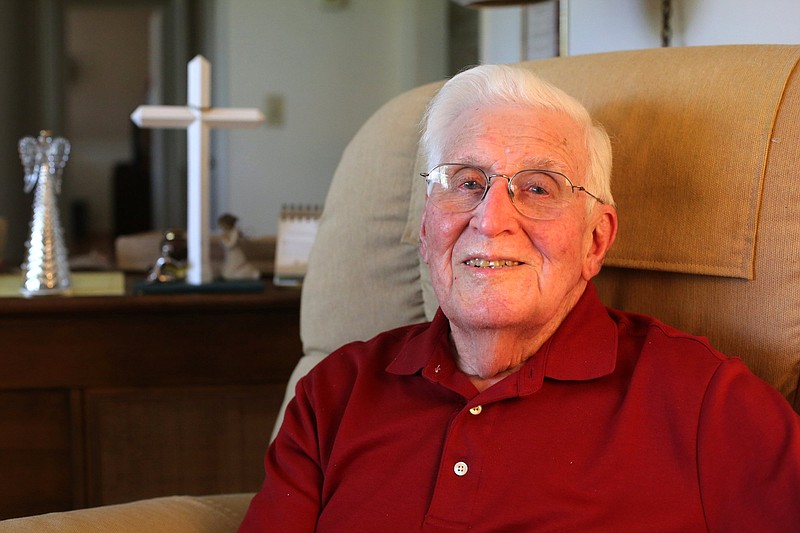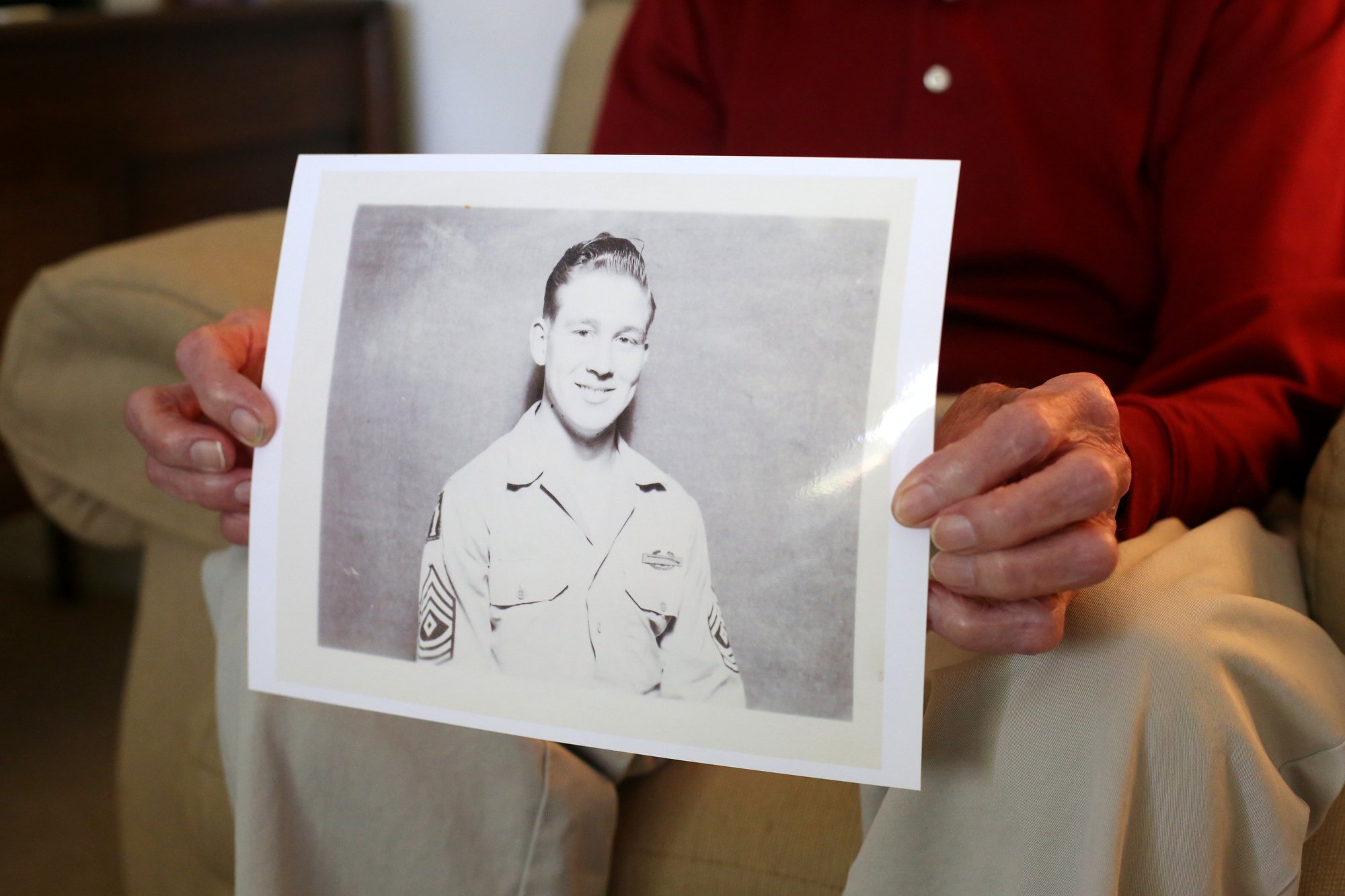Curtis Revels knew he was bound for military service one way or the other when he turned 18 in 1944, so he went ahead and signed up. Well, he tried to.
"When I turned 18, to avoid the draft, I went and tried to join the Navy," Revels said. "But they said I was colorblind and had flat feet, so they wouldn't take me."
He heard from the Army soon after. "I was drafted into the Army infantry," Revels said. "They told me, 'We'll give you some shoes to fit those flat feet.'"
The young man from the tiny town of Rutherfordton, North Carolina, was bound for Okinawa, the site of the Battle at Hacksaw Ridge. Revels was a machine gunner in the aftermath of one of the last and bloodiest battles in the Pacific during World War II.
"My stay wasn't long there, but long enough to learn what fighting for my life was like," Revels said. "We were there three weeks. It felt longer than that. You didn't make friends. You were fighting all the time. If you were pulled back off the line, you were trying to rest or trying to get something to eat."
Revels, 93, lives in East Ridge, in the house he and wife Betty moved into in 1970 with their two young children. He never talked with his family about his time at war, Revels said.
BIO
Name: Curtis RevelsAge: 93Branch of military: U.S. Army/Army Air ForceYears of service: three during WWII; two during the Korean War
(Read about other local veterans in our "21-Veteran Salute" series here)
As a matter of fact, he's not especially interested in talking about it now.
"It was all in the past," Revels said. "There's nothing exciting to what I did."
But there was an event at GraceWorks Church where the congregation he is part of was honoring veterans, and his friends wanted to know his story, Revels said. His daughter had asked, too, and he figured he'd talk about it a little bit to accommodate them.
"I have the closest, dearest friends at church," said Revels, whose wife passed away in 2011. "They look after me."
Revels began his military service in December 1944 knowing only that he was bound for war. He completed basic training at Fort McClellan, Alabama, and then took a train across the country to Fort Ord, California. From there, he and his fellow soldiers were sent to Washington state.
"That's when we knew we were heading overseas," Revels said. They headed to Hawaii and spent a day at Pearl Harbor, where they learned the name of the ship they'd be on. "We went and found it, and when we saw all the guns on it, I knew we were heading for war," he said.
The ship carried the men to Saipan in the Mariana Islands, where they stayed for several months. There was no combat on Saipan, though there were Japanese soldiers there. "We didn't care to fight them, and they didn't care to fight us," Revels said.
But that relative peace was over once the men began forming companies and preparing to leave the island.
"We didn't know what we were doing, but we were preparing to go to Okinawa," Revels said. "When we got there, we all dropped off the side of the ships into smaller boats and made a beach landing on the southern tip of Okinawa."
It was June 17, 1945 - the final week of the protracted, bloody battle that began on Okinawa on April 1. The island was riddled with caves and defined by steep cliffs. Revels was part of the 77th Infantry, the same division as Desmond Doss, the heroic combat medic and conscientious objector who saved 75 of this comrades during the Battle of Okinawa.
"Sniper fighting, mortar firing and using flamethrowers into caves was a different type of life for me," Revels said. "I didn't get scared, but I started wishing I had taken my basic training more seriously."
After weeks of fighting, the men left the island on an LST - a landing ship, tank made for transporting equipment.
"The ship wasn't made to carry personnel. We slept on the deck, on the steel," Revels said. But, he added, it was better than trying to sleep on Okinawa. "If I got any sleep there, I slept on a poncho laying on the mud. There was a lot of mud."
The division arrived in the Philippines, on the island of Cebu, on July 4, 1945, where they regrouped and trained for further battle. But the war was winding down and Japan was expected to surrender soon, Revels recalled. And it did surrender - on Aug. 14, 1945.
"Those who drank did their share of drinking to celebrate," Revels said. "I watched the others act like monkeys climbing - or attempting to climb - coconut trees. I didn't drink so I was able to enjoy the action."
The war was all but over, but Revels still had time left to serve. He went from Cebu to Hokkaido, the northernmost island of Japan, where he remained for months, mining and hauling coal. As the 77th Infantry deactivated, Revels was transferred in February 1946 to the Army Air Force and Johnson Air Base outside of Tokyo.
"I went from machine gunnist to clerk/typist," Revels said. "Typing was one thing I had done well in high school. It has served me quite well all through my life."
In January 1947, Revels was officially discharged from the military at Fort Lewis, Washington, after three years of service. He rode a Greyhound bus back to Rutherfordton, North Carolina - a trip that took three days. When he got home, he joined the Reserve and took a job driving for a dry cleaner.
In 1948, he met Betty Burch while he was making a delivery to her father's house. In April 1951, they married. And, at about the same time, the military came calling again. Recalled during the Korean War, Revels went to Fort Leonardwood, Missouri, while his wife went home to her parents in North Carolina.
"I didn't like it, but there was nothing I could do about it," Revels said.
Eventually, Betty joined him, and Revels was transferred to Orlando, where he worked on a military base for 18 months.
"The best time in my military life was in Orlando," he said. "My wife was with me. I enjoyed what I was doing. I became good friends with my boss."
Once he left military service again in 1953 - this time for good - Revels stayed in Orlando and found work as a lithographer and printer. His career eventually led him to work for a company that transferred him to Chattanooga in 1957. He didn't stay long, but when he was making another career change in 1970, and asked his wife where she wanted to live, she said she wanted to return to the city. They raised their family in their house in East Ridge, and never talked much about things past.
"I've always been a better listener than talker," Revels said. "When you're talking, you're not learning anything."
Contact Mary Fortune at mfortune@timesfreepress.com or 423-757-6653. Follow her on Twitter at @maryfortune.

